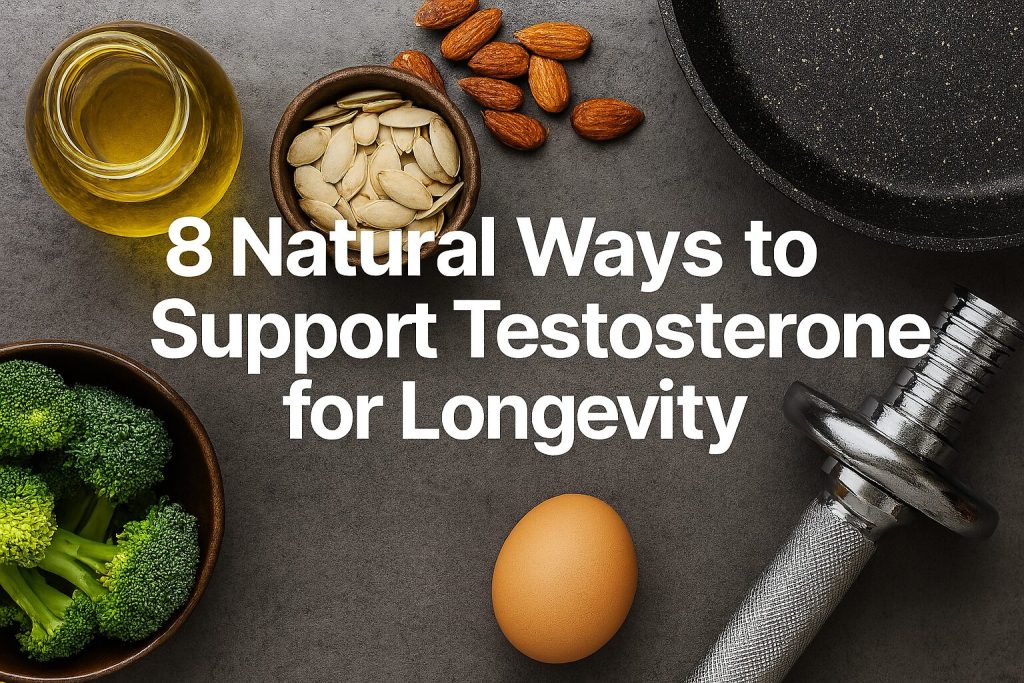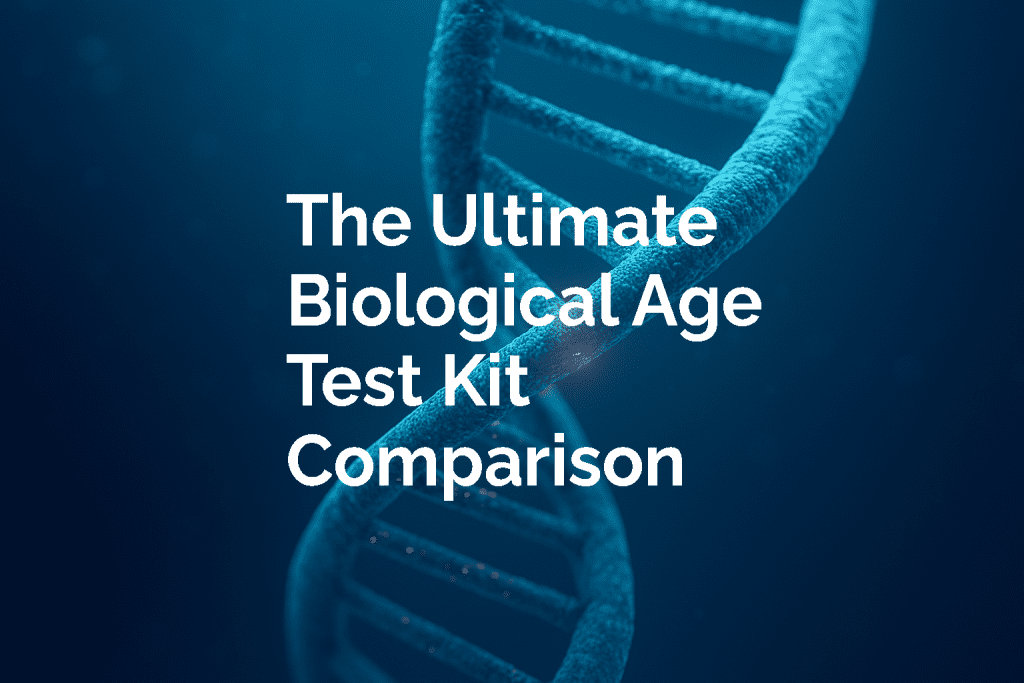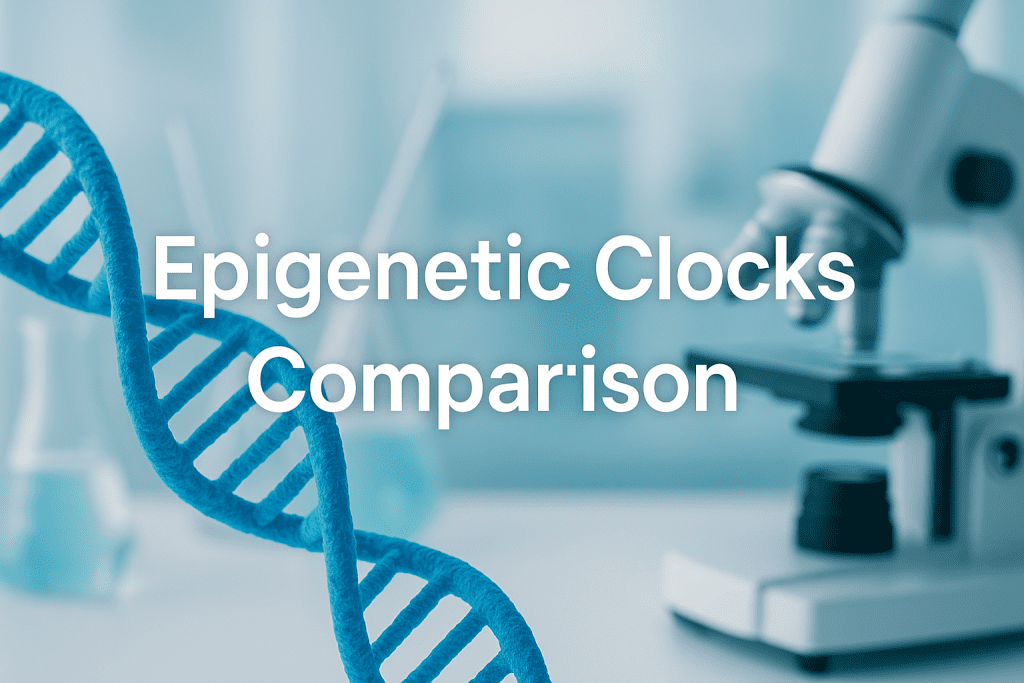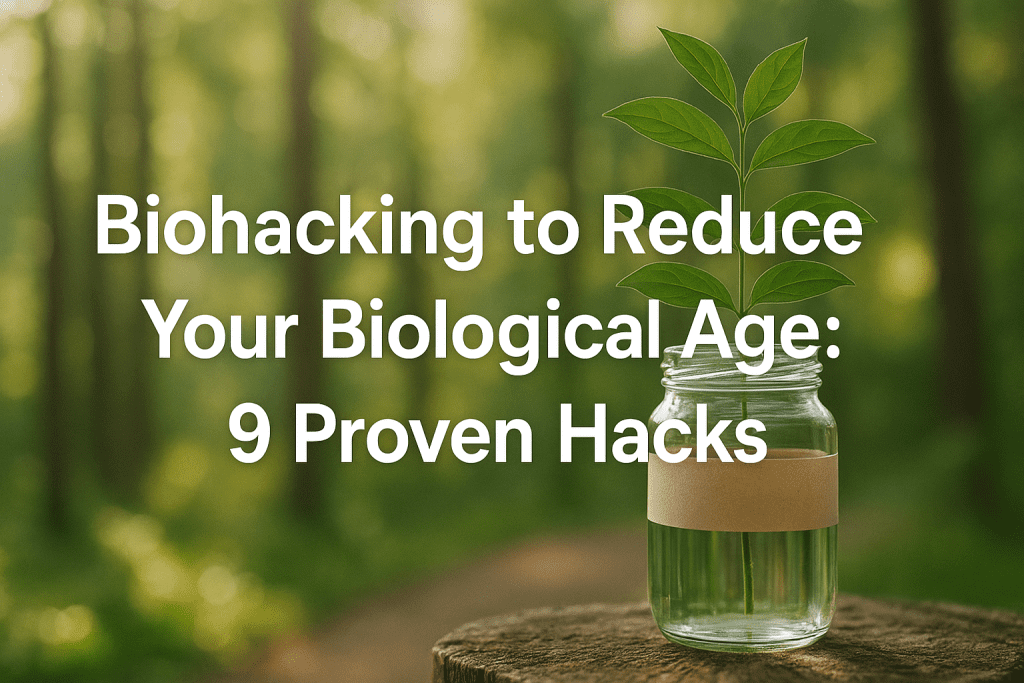
How to naturally protect your hormones, boost energy, and slow aging with science-backed methods
Testosterone isn’t just about muscle or libido. It’s a powerful hormone that plays a key role in metabolism, energy, mood, and even lifespan.
As you get older, testosterone levels often drop, but science shows that there are natural ways to support this vital hormone.
In this article, you’ll learn 8 proven strategies to support testosterone for longevity—all backed by research and easy to implement.
Table of Contents
🧠 Why Testosterone Matters as You Age
Testosterone plays a key role in:
- Muscle mass and strength
- Bone health and fracture prevention
- Brain function and mood stability
- Fat metabolism and insulin sensitivity
- Immune system balance
- Sexual health and vitality
Low levels are linked to frailty, higher biological age, and reduced life expectancy, even in women.
🍳 1. Eat Testosterone-Supporting Foods
Your diet can make or break your hormones.
✅ Healthy fats: Testosterone is made from cholesterol. Focus on sources like olive oil, avocados, pasture-raised eggs, and nuts.
✅ Zinc-rich foods: Oysters, beef, pumpkin seeds: zinc is crucial for testosterone production.
✅ Magnesium: Found in leafy greens, almonds, and dark chocolate. It boosts free testosterone levels.
✅ Cruciferous vegetables: Broccoli, cauliflower, and Brussels sprouts help reduce excess estrogen by supporting liver detox.
🧪 Tip: A biological age test can help track how these dietary upgrades are affecting your hormone-driven aging markers.
💤 2. Sleep More (Seriously)
One bad night of sleep can drop testosterone levels by up to 15%. Chronic sleep debt is even worse.
✅ Aim for 7–9 hours
✅ Avoid blue light and caffeine in the evening
✅ Keep your room cool and dark
✅ Try magnesium or glycine before bed if needed
📉 Sleep loss = faster aging and hormonal decline. Fix this first before anything else.
🏋️ 3. Train Smart, Not Just Hard
Not all workouts are equal for testosterone.
✅ Best: Compound strength training (squats, deadlifts, pull-ups)
✅ Short bursts of HIIT can increase testosterone post-workout
❌ Avoid chronic long-distance cardio: it can spike cortisol and lower testosterone over time
Even 3 short sessions a week makes a measurable difference. Bonus: lifting boosts insulin sensitivity and bone density.
☀️ 4. Get Real Sunlight (or D3 Supplement)
Vitamin D acts like a hormone in the body and low D = low testosterone.
✅ Aim for 20 minutes of sunlight daily (without sunscreen)
✅ If you supplement, use D3 + K2
✅ Test your levels if unsure — aim for 40–60 ng/mL
🌞 Low Vitamin D is one of the most common deficiencies linked to low testosterone.
🚫 5. Ditch These T-Drainers
Want to support your hormones? Start by removing what hurts them.
❌ BPA & plastics: Found in bottles, containers, receipts
❌ Excess alcohol: Disrupts liver detox and lowers free T
❌ Processed carbs & sugar: Promote insulin resistance, which lowers testosterone
❌ Chronic stress: Elevates cortisol — the testosterone killer
🎯 Swap plastic for glass, cut sugar, and learn to manage stress. That alone can improve your testosterone profile.
🌿 6. Natural Supplements With Backed Evidence
Some natural ingredients show modest testosterone benefits in clinical studies:
- Ashwagandha: Helps lower cortisol and raise T in stressed men
- Tongkat Ali (Longjack): Shown to raise free testosterone and libido
- Fenugreek extract: May support free testosterone levels
- Zinc & Magnesium: Both help restore levels when deficient
🧬 Not magic pills: but helpful additions when paired with lifestyle changes.
🧘♂️ 7. Manage Stress for Hormonal Balance
Cortisol (your stress hormone) competes with testosterone. When one is high, the other drops.
✅ Practice breathwork or meditation
✅ Spend time in nature
✅ Lift weights instead of overtraining
✅ Get off screens earlier in the evening
Simple stress management = better testosterone + better aging trajectory.
⚖️ 8. Maintain a Healthy Weight
Excess body fat, especially around the belly, leads to more aromatase enzyme, which converts testosterone to estrogen.
✅ Losing just 5–10% body fat can significantly raise T
✅ Use waist circumference or waist-to-height ratio as a guide
✅ Don’t crash diet — aim for slow, sustainable fat loss
This change alone often reverses mild testosterone decline.
🧪 Can You Track Your Testosterone’s Impact on Aging?
Yes, through biological age tests like TruAge, GlycanAge, and NOVOS.
- Some tests track immune aging (GlycanAge)
- Others show how your organ systems are aging (TruAge)
- NOVOS includes telomere length + pace of aging
If your testosterone improves, you may see changes in your biological aging markers over 3–6 months.
🔗 Check out our guide: Best Biological Age Tests
Sources
- Harvard Health On Testosterone Decline
- Age Related Testosterone Decline (NIH)
- Which Exercise Is Better for Increasing Serum Testosterone (NIH)
Common Questions about Testosterone for Longevity
What are the best foods to boost testosterone naturally?
Eggs, oysters, pumpkin seeds, olive oil, and cruciferous vegetables help support testosterone through zinc, healthy fats, and estrogen detox pathways.
Can low testosterone speed up aging?
Yes. Low testosterone is linked to higher fat, reduced muscle mass, poor insulin control, and weaker bones, all associated with faster biological aging.
How does exercise affect testosterone levels?
Strength training and short HIIT sessions raise testosterone levels. But overtraining or too much cardio can increase cortisol and lower T.
Is Ashwagandha really effective for testosterone?
Multiple studies suggest Ashwagandha can increase testosterone in men, especially those with high stress and cortisol.
Can you track testosterone’s impact with a biological age test?
Yes. Methylation-based age tests like TruAge and NOVOS can show if testosterone-supporting habits are slowing your aging rate. Results often take 3–6 months.
Created by SimplyAntiAging.com’s Editorial Research Team
Reviewed and updated for accuracy in January 2026.



